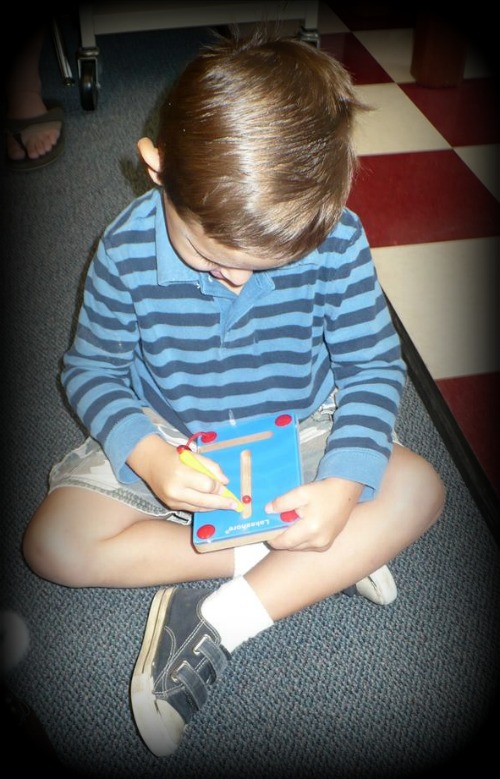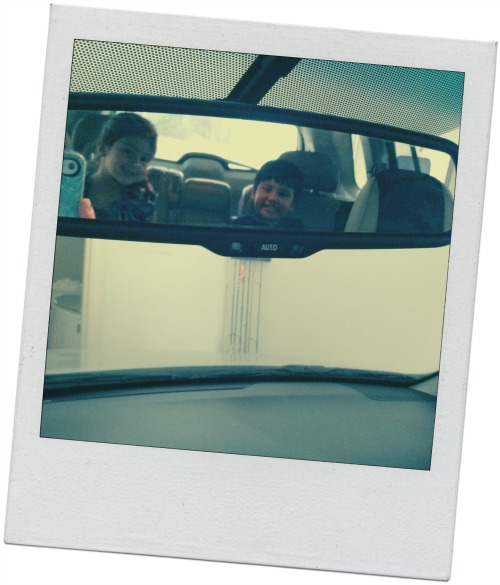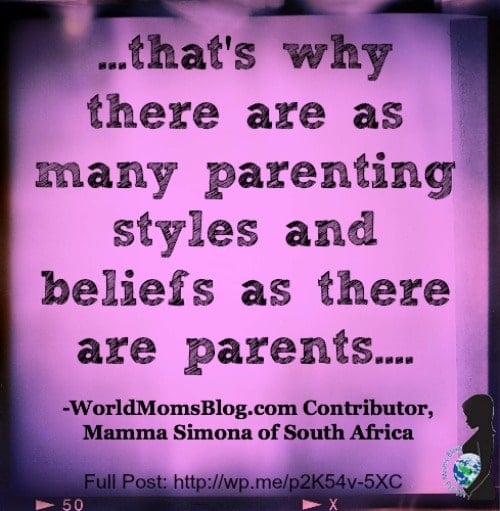
by Sophie Walker (UK) | Mar 17, 2014 | 2014, Being Thankful, Childhood, Education, Girls, Kids, Life Lesson, Motherhood, Parenting, Preschool, Sophie Walker, Special Needs, UK, Uncategorized, World Motherhood, Younger Children
 Betty and I are walking to school in the rain. It is a miserable morning – grey, cold and squally. We are tilting our umbrellas sideways to shield ourselves from the gusts of needles thrown at us as we progress along the avenue. I am forcing bright chatter and thinking of the warm cup of tea I will have when I get home.
Betty and I are walking to school in the rain. It is a miserable morning – grey, cold and squally. We are tilting our umbrellas sideways to shield ourselves from the gusts of needles thrown at us as we progress along the avenue. I am forcing bright chatter and thinking of the warm cup of tea I will have when I get home.
Betty’s umbrella is white and pink and round like a daisy. It has pretty little petals and yellow stripes, and a bumble-bee attached to the top. The bumble-bee is looking very sorry for himself this morning, buffeted hither and to. I can’t see Betty’s face but I can tell by the drag of her toes that she is feeling sorry for herself too.
I lean down and enquire: “How are you doing, darling?”
A woebegone voice answers. “Ok.”
Then she asks: “Mummy, did this umbrella used to belong to my big sister?”
I tell her yes, it did.
“And Mummy, did she used to walk to school with it too?”
Again, I aver, she did.
A pause. Then, cautiously: “Mummy, did my sister ever used to not want to go to school?”
I can see where this is going now and I give her hand a sympathetic little squeeze. I say yes, there were days when her big sister didn’t really feel like it either.
At this Betty stops and tips back the rim of her umbrella to look up at me. Her eyes are welling with tears. She asks: “And did she used to worry about making mistakes too?”
Betty started school last September at the age of four. She is now four and a half and a month into her second term. She flew through the first twelve weeks with ease – enthusiastic, inquisitive, and keen to try new things. This term, she has cried often on leaving me in the mornings. Afternoons start with jubilation at being home, then slide slowly from relaxation to upset as night approaches.
As soon as I call her for her bath it is her cue to start an hour-long conversation about whether or not she will have to go to school again in the morning.
Now I look at her, looking up at me, her face a mixture of rain and tears, and I think: She’s far too little for all this. I bend down to her and put my umbrella down and hug her. I tell her: “Everyone makes mistakes. It doesn’t matter about making mistakes. The thing is just to try your best. Have a little go.”
But as I’m saying it, I’m thinking that really, I just want to put her in my pocket and take her home. She is not yet five. She shouldn’t be afraid of new things in case she finds herself unable to do them to a standard that will make her happy.
Last term, she learned phonics – how to make the sounds of the alphabet. This term, she has realised that those phonics are letters and that by putting them together and sounding them out she can both read and write. And it terrifies her.
It is Learning with a capital ‘L’. Every day now she wonders what Learning she will have to conquer next.
The British education system is under huge scrutiny at the moment. The coalition government’s Conservative education minister Michael Gove has decided that it needs an overhaul. There is too much emphasis on coursework, so he has decreed the system should revert to a grand slam of end-of-year exams. There is not enough emphasis on rote learning, so reciting dates and times-tables are back in.
So far I have reacted to Gove’s decisions with horror mainly because of the impact they will likely have on my elder daughter, who has Asperger’s Syndrome, and will struggle even more under a system that removes the chance for her to shine via project work. Gove’s reforms are a disaster for Grace.
Now, looking at Betty, who I had expected to skip through the system, I find myself wondering how she will cope. Recently Gove said he was thinking of introducing formal assessments for four and five-year-olds when they enter school in England, in order to be able to monitor their progress.
I care that my children should progress well through the education system, and flourish in their chosen careers. But as I kissed Betty goodbye in her classroom that morning, and watched her teacher take her gently by the hand to distract her from her upset, I thought: there must be a better way to do this.
So – how do you do it, where you live? And do you think it works?
This is an original post to World Moms Blog from our writer in England, Sophie Walker.
The picture used in this post is credited to Roger McCallum. It holds a Flickr Creative Commons attribution license.

Writer, mother, runner: Sophie works for an international news agency and has written about economics, politics, trade, war, diplomacy and finance from datelines as diverse as Paris, Washington, Hong Kong, Kabul, Baghdad and Islamabad. She now lives in London with her husband, two daughters and two step-sons.
Sophie's elder daughter Grace was diagnosed with Asperger Syndrome several years ago. Grace is a bright, artistic girl who nonetheless struggles to fit into a world she often finds hard to understand. Sophie and Grace have come across great kindness but more often been shocked by how little people know and understand about autism and by how difficult it is to get Grace the help she needs.
Sophie writes about Grace’s daily challenges, and those of the grueling training regimes she sets herself to run long-distance events in order to raise awareness and funds for Britain’s National Autistic Society so that Grace and children like her can blossom. Her book "Grace Under Pressure: Going The Distance as an Asperger's Mum" was published by Little, Brown (Piatkus) in 2012. Her blog is called Grace Under Pressure.
More Posts

by Maman Aya (USA) | Mar 14, 2014 | 2014, Awareness, Communication, Education, Kids, Milestones, Motherhood, Parenting, Preschool, Special Needs, USA, World Motherhood, Younger Children
 My son is eight months old and clearly utters his first word, and quickly starts to add more words into his daily speech and quickly starts to put them together to form ‘sentences’…in multiple languages! At 9 months old I start to potty train him, and he understands what I am trying to teach him.
My son is eight months old and clearly utters his first word, and quickly starts to add more words into his daily speech and quickly starts to put them together to form ‘sentences’…in multiple languages! At 9 months old I start to potty train him, and he understands what I am trying to teach him.
‘This child is brilliant’, all the adults in his life agree.
My son is about a year and a half. He goes to play at a nearby kids gym which has an area to climb and slide, a Lego area, an area to jump, balls, puzzles, magnets and blocks, etc. So many fun things for a toddler to do. Most kids are so excited. They run in and start playing with all of the toys. But not my son. He walks in and stands off to the side to observe the other children and watch what they do. To understand what is expected, I suppose. Once he understands what the other kids are all doing and how he is expected to behave and play with them, he joins the fun – and he has a blast – never wanting to leave.
When he is 18 months – 3 years old he takes ‘mommy and me’ classes on subjects he enjoys, like construction, art, French, music and cooking. He is tentative and does not participate straight away. It takes some time for him to warm up and I (or my mother, who is his daytime caretaker while I am at work) have to do most of the activity for him until about 10 minutes before the end of the 40 minute classes, week after week.
He is almost 3 and has started ‘school’, a few times a week, 3 hours at a time. The teachers comment that he would rather talk with them (and his vocabulary is amazing for a 3 year old – he started talking at 8 months after all), than play with his friends. He watches his friends and directs them (tells them if they are breaking a rule, or shows them how to do something), but does not easily go and play with them. He is more like one of the teachers than one of the 2 or 3 year-olds. I also notice that he doesn’t recognize, or confuses his letters (like mixing M and W), like other 3 year-olds.
This trend continues, although he does get better at socializing. He does get better at playing with other children, but only because he mimics their actions (good or bad). He doesn’t realize when an action is” not good”, because someone else did it before him, so it must be okay.
At 4 years old he starts having tics. His pediatrician tells me it’s normal for boys, there is nothing wrong with him. I take him to an eye doctor (one of his tics involves rolling his eyes), and he does need glasses, but the opthalmologist tells me that the tics are normal. I take him to a neurologist, who tells me nothing is wrong with him. Over the years I continue to express my concerns to the pediatrician. We realize that the tics are caused when he is stressed or excited.
“Nothing wrong,” says the doctor. This is not very reassuring.
I speak to his teachers over the years who assure me he is incredibly bright. He is mature. His vocabulary and speech are well ahead of his age, yes he is still mixing up letters, but the teachers assure me that it is within a normal range. He is indeed a very special child, teacher after teacher says.
But all of the reassurances in the world do not stop me from thinking that my son is different.
I watch to see if the other kids shun him…. they don’t seem to, but he is not choosing the friends that I would like him to have. That is to say, the nicer, gentler boys. I am afraid that he may be choosing the rowdier friends because he is over compensating. He is trying to fit in.
Fast forward to this past September. He started first grade as a normal 6 year-old. He was given a reading assessment (as were all of his classmates) and no red flags. About two months into the school year his teacher noticed that he was not doing as well as she would like, so she had him assessed even further. This time there were warnings. He is having problems reading (which I had asked his teachers about previously). He starts to spend one-on-one time with the reading specialist in his school and he has been making some progress, but there is some concern. I mention to the reading specialist that personally, I believe he may be dyslexic. She agrees that he does in fact have a “reading disability” (apparently dyslexia falls under that category these days), but that she is not qualified to be able to properly diagnose him.
That conversation was a few weeks ago. I feel relieved and worried. We have to keep working the system visiting specialist after specialist until I get an actual diagnosis. I don’t want to frighten him by taking him to see these specialists, but I do want to get an understanding of what I should do. And once I get a diagnosis, what should I do with it? How can this affect the rest of his learning, his education, and ultimately his life? What if the other kids make fun of him or shun him? How is this the same child who scored in the 90th + percentile on his kindergarten entrance exam on vocabulary, conversation and comprehension? (Yes they actually administer this test in NYC.) What if we decide to move, and have to change his school…will he have the help he needs to succeed? I have so many unanswered questions, and feel overwhelmed and not sure where to start…
Does you child have a learning disability? How did you find out? How have you helped your child learn to cope?
This is an original post to World Moms Blog by Maman Aya and was inspired by fellow WMB contributor Sophie Walker’s post, The Book I Never Thought I would Write.
Photo credit to Lesley Show. This photo has a creative commons attribute license.

Maman Aya is a full-time working mother of 2 beautiful children, a son who is 6 and a daughter who is two. She is raising her children in the high-pressure city of New York within a bilingual and multi-religious home.
Aya was born in Canada to a French mother who then swiftly whisked her away to NYC, where she grew up and spent most of her life. She was raised following Jewish traditions and married an Irish Catholic American who doesn’t speak any other language (which did not go over too well with her mother), but who is learning French through his children. Aya enjoys her job but feels “mommy guilt” while at work. She is lucky to have the flexibility to work from home on Thursdays and recently decided to change her schedule to have “mommy Fridays”, but still feels torn about her time away from her babies. Maman Aya is not a writer by any stretch of the imagination, but has been drawn in by the mothers who write for World Moms Blog. She looks forward to joining the team and trying her hand at writing!
More Posts

by Ana Gaby | Mar 6, 2014 | 2014, Communication, Family Travel, Home, Indonesia, International, Kids, Living Abroad, Motherhood, Parenting, Travel, World Motherhood, Younger Children
 Not too long ago, my four-year-old started understanding the concept of fairness vs. unfairness. To him, life is unfair, oh so many times ,during the day. To me, the fact that he can express his frustration over a denied chocolate treat before dinner or being sent back to sleep in his room when he tries to sneak into mom and dad’s bed, is just another sign of my toddler becoming a big boy.
Not too long ago, my four-year-old started understanding the concept of fairness vs. unfairness. To him, life is unfair, oh so many times ,during the day. To me, the fact that he can express his frustration over a denied chocolate treat before dinner or being sent back to sleep in his room when he tries to sneak into mom and dad’s bed, is just another sign of my toddler becoming a big boy.
Evan has not only learned to voice his frustration but has become a strong little boy with convictions. He will call my husband and I out on our mistakes and let us know how he believes what we are doing is not fair and shouldn’t be done. Sometimes I just chuckle, but sometimes my heart just skips a beat. For Evan, unfairness is represented by tangible things he cannot have or those few extra minutes in front of the TV that he wasn’t allowed. I feel so blessed that, so far, this is all the unfairness he has had to face. (more…)
Ana Gaby is a Mexican by birth and soul, American by heart and passport and Indonesian by Residence Permit. After living, studying and working overseas, she met the love of her life and endeavored in the adventure of a lifetime: country-hopping every three years for her husband’s job. When she's not chasing her two little boys around she volunteers at several associations doing charity work in Indonesia and documents their adventures and misadventures in South East Asia at Stumble Abroad.
More Posts

by Meredith (USA) | Feb 28, 2014 | 2014, Communication, Family, Kids, Life Lesson, Motherhood, Parenting, World Motherhood, Younger Children
 It happens every night when I lay my head on the pillow. I replay many of the day’s events back over in my mind. “Was I good friend, wife, sister, daughter, etc.? Was I good mother to my children? Did I set a good example?”
It happens every night when I lay my head on the pillow. I replay many of the day’s events back over in my mind. “Was I good friend, wife, sister, daughter, etc.? Was I good mother to my children? Did I set a good example?”
However, the events which have been playing over in my mind more and more frequently are the times I am not sure if I really listened to my children. “What was it my daughter was telling me about a friend of hers at school as I was hurriedly sending a text to my friend? What was my son showing me that he learned on his new video game as I nodded and pretended to see him play it while I sent an email?”
I know we all get caught up in this thing called life, but are we really present for our children?
At any one minute during the day, I feel like I have a laundry list of things to get done. A lot of times, I find myself sitting listening to my daughter read, and I am making a mental list in my mind of what I need to get from the grocery store. When I’m driving the kids to school, and they are in the backseat laughing, I am thinking of the things I need to get done that day while they are in school. What were they laughing about? I don’t know because I wasn’t really listening. And, that makes me a little sad.
I know one day, I’ll look in my rear-view mirror and they will be in junior high and then high school and they won’t be my little children anymore.
I have read so many articles and talked to so many friends about our kids being able to pay attention to what we, as parents, say. We have talked and discussed how too much time on electronics isn’t good for their attention. What about us as parents? It became crystal clear to me a few weeks ago when I took my children to the park. My son was on the swing, and I received a text from a friend. I was replying to her text while my son was saying something to me and I remember nodding and saying “Okay.” It turns out that he asked me if I would pay him a quarter for every time he jumped off the swing. You can imagine how surprised I was when he told me I had to pay him $4.50 for jumping 18 times!!!
These past few weeks, I have been thinking about how I have approached mothering, and I think I had something wrong. For some of you this may not be earth shattering, but for me it was ground breaking. And here it is…I will never be done with a grocery list, laundry list, cleaning, cooking, etc. There will always be broken things which need fixing and plants needing to be watered.
I was approaching things in my mind as things to check off like a list. I was thinking of my days as a destination, and that just isn’t how life is. In my head I thought if I get that grocery list done, then it is complete. If I finish this load of laundry, then it is done. But, the truth is, neither of those tasks are ever done, and unfortunately, I feel that I have wasted some of my precious time with my children using that approach.
I have started to look at my life as a journey and to try to enjoy it more along the way.
Coming to this realization has freed me to sit with my daughter and just listen to her read for 20 minutes without my phone right next to me. I don’t have to answer texts right away. I am able to watch my son play his new video game and show me his new trick because the laundry will always pile up, and I can get to it after I take 10 minutes to listen to him. I am waking up 10 minutes earlier to get lunches packed so I can talk to my kids in the morning while they are eating breakfast. I am taking a little of the pressure off myself to get everything done. I am getting most things done, and the things I don’t get to can wait until tomorrow if it means I can have some extra special moments with my kids.
I have found that slowing down my mind and my “to-do” list have made me a bit more calm, and in turn, it has helped me to be in the moment with my kids. Every night, we have dinner together and there is a “no toy and no electronics rule” at the table. It’s a time for our family to really listen to each other and make sure that we have a few minutes to “check in” all together as a family.
The one thing that won’t always be there are my 5 and 8 year olds. They are only like that for one year and then they just keep growing and growing and there isn’t anything I can do about it. As I look at them in my rear-view mirror, I want to know that I have really enjoyed them and not regret not spending precious time with them.
Do you have a way to really be “in the moment” with your children?
This is an original post for World Moms Blog by Meredith. You can check out Meredith’s life in Nigeria and her transition back on her blog at www.wefoundhappiness.blogspot.com.
Photo credit to the author.
Meredith finds it difficult to tell anyone where she is from exactly! She grew up in several states, but mainly Illinois. She has a Bachelor of Science degree in Elementary Education from the University of Illinois at Champaign/Urbana which is also where she met her husband. She taught kindergarten for seven years before she adopted her son from Guatemala and then gave birth to her daughter two years leter. She moved to Lagos, Nigeria with her husband and two children in July 2009 for her husband's work. She and her family moved back to the U.S.this summer(August 2012) and are adjusting to life back in the U.S. You can read more about her life in Lagos and her adjustment to being back on her blog: We Found Happiness.
More Posts

by Nadege Nicoll | Feb 21, 2014 | Family, France, Humor, Motherhood, Nadege Nicoll, Parenting, World Interviews, World Moms Blog Writer Interview, Younger Children
 Where in the world do you live? And, are you from there?
Where in the world do you live? And, are you from there?
I live in the USA, in New Jersey to be more precise. I am originally from France but have been living abroad for almost twenty years – mainly in England and now here.
What language(s) do you speak?
I speak French and English. In a previous life, I used to be able to hold a conversation in Spanish, but those days are gone…
When did you first become a mother?
My first child was born ten years ago. I have three children and I feel that I became a new, different mother with each of them. So to answer the question fully, I first became a mother ten years ago, then nine years ago and four years ago.
Are you a stay-at-home mom or do you work?
I stopped working to be with my kids. Now, I write books for elementary school aged children. I don’t know if it qualifies as “working”, because I love it so much it does not feel like work at all.
Why do you blog/write?
There are a few reasons why I blog. Firstly, I want to put a smile on other moms’ faces. My blog is a humorous take on motherhood and I for one know that I always have room for a little humor in my life! Secondly, blogging is a great outlet for me: instead of getting upset because I just told my kids to pick up their coats and they are looking at me like I am from another planet, I just snap a picture of their faces and blog about it. Finally, I am hoping that if people like my blogging style, they will get curious about my books – and love them as well.
How would you say that you are different from other mothers?
I am not. Like any other mom, my most important mission is to take care of my family and I thrive to do the best that I can. I am not perfect, I don’t always get it right, I have my fair share of mistakes, misjudgments and mishaps. But I try my best. Everyday.
What do you view as the challenges of raising a child in today’s world?
When I was a kid, I would make mistakes and my parents would use this as an opportunity to help me learn from it. Nowadays, we have to teach our children to not get it wrong at all – because, in a world where everybody is connected, a wrong statement, a silly act that would have had little consequences in my days, are going to be tweeted, snapped on a picture and posted on the net. They could define our kids for the rest of their lives. That scares me. There is no trial and error for them anymore. That’s a horrible thought. Imagine if our mom abilities were defined by what we do wrong?
How did you find World Moms Blog (WMB)?
I met one of WMB editors at a friend’s house and we connected right away. For all the things that scare me about internet, it also enabled me to get connected to this great group of women.
This interview is an original post to World Moms Blog by Nadege Nicoll, our new USA writer in New Jersey.
ABOUT NADEGE
Nadege Nicoll was born in France but now lives permanently in New Jersey with her family. She stopped working in the corporate world to raise her three children and multiple pets, thus secretly gathering material for her books. She writes humorous fictions for kids aged 8 to 12. She published her first chapter book, “Living with Grown-Ups: Raising Parents” in March 2013. It is a pretend self-help handbook for children to cope with their parents’ inconsistencies. Her second volume in the series just came out in October 2013. “Living with Grown-Ups: Duties and Responsibilities” has gone one step up in showing parents’ whacky behavior! Although the primary audience for her series is kids, parents are sure to giggle and laugh at their own weird ways. It will be hard for them to tell their kids off with a straight face after they read “Living with Grown-Ups”! Nadege also writes a daily blog for moms who need to smile at every day’s life. She can be found on Twitter, Facebook and her website www.nadegenicoll.com.
Nadege Nicoll was born in France but now lives permanently in New Jersey with her family. She stopped working in the corporate world to raise her three children and multiple pets, thus secretly gathering material for her books. She writes humorous fictions for kids aged 8 to 12. She published her first chapter book, “Living with Grown-Ups: Raising Parents” in March 2013. Her second volume in the series just came out in October 2013. “Living with Grown-Ups: Duties and Responsibilities” Both books take an amusing look at parents’ inconsistent behaviors, seen from the perspective of kids. Nadege hopes that with her work, children will embrace reading and adults will re-discover the children side of parenthood. Nadege has a few more volumes ready to print, so watch this space…
More Posts - Website
Follow Me:



by Mamma Simona (South Africa) | Feb 20, 2014 | Parenting, South Africa, Uncategorized, World Motherhood

I clearly remember (as a young first-time mother struggling with my son’s colic and projectile vomiting) being told by other mothers; “Oh, that’s nothing, just you wait until he hits the Terrible Twos!”
That colicky baby turned 21 last month, and I have learnt a few things along the way! First and foremost, children tend to live up to our expectations (even our subconscious expectations). If you’re sure that you will experience the “Terrible Twos” chances are better than fair that you will. The sad thing is that most parents don’t know that it doesn’t have to be that way!
Every child is unique, and every parent-child relationship is different, that’s why there are as many parenting styles and beliefs as there are parents. That said, most parenting sites and blogs tend to reinforce certain ideas (like that of the Terrible Toddler years and Terrible Teen years) so that new parents accept them as being inevitable stages of life.
“Robert Rosenthal brought to public attention a powerful type of self-fulfilling prophecy, in a classic experiment about the expectations of teachers (Rosenthal & Jacobson, 1968). In the experiment, all the students in a class were given a standard IQ test. After the results were scored, the researchers informed the teachers that five students in the class had unusually high IQ scores and would probably be “spurters” who leaped ahead of their classmates during the remainder of the year. In reality, the five children were picked at random. By the end of the year, all the children had gained in IQ, but the five “spurters” had gained much more than other students. Evidently the teachers treated them differently after being told to expect sudden improvement.”
Since 1968 many similar experiments to the one cited above have been carried out.
“Rosenthal notes that the expectancy effect has been documented in business management (where the biasing effect is the expectations of employers about their employees), in courtrooms (where the biasing effect is the expectations about the defendant’s guilt or innocence), and in nursing homes (where the biasing effect is the expectation that a patient will get better or worse).
In all cases, the expectations tend to come true, whether they are based on any objective evidence or not.
Apparently, as a general rule, people make their expectations come true. Rosenthal’s research shows the Pygmalion effect is not only important; it is robust. It is a strong effect that occurs in many situations.”
I believed in the “Terrible Twos” with my son (because I didn’t know any better) and we battled for 2 years! By the time my daughter was born, I’d learnt a lot, and I believed we wouldn’t have any trouble at all … guess what, we didn’t! We also haven’t experienced any of the unpleasantness that some believe is unavoidable during the pre-teen, teen and early adulthood years.
Given the above, I feel that the Terrible Twos and Terrible Teens are only fact if you believe them to be!
Can you think of ways in which your children have lived up to your expectations? Do you believe that by expecting a different result you can create a different result?
This is an original post for World Moms Blog by Mamma Simona from Cape Town, South Africa.

 Betty and I are walking to school in the rain. It is a miserable morning – grey, cold and squally. We are tilting our umbrellas sideways to shield ourselves from the gusts of needles thrown at us as we progress along the avenue. I am forcing bright chatter and thinking of the warm cup of tea I will have when I get home.
Betty and I are walking to school in the rain. It is a miserable morning – grey, cold and squally. We are tilting our umbrellas sideways to shield ourselves from the gusts of needles thrown at us as we progress along the avenue. I am forcing bright chatter and thinking of the warm cup of tea I will have when I get home.

 My son is eight months old and clearly utters his first word, and quickly starts to add more words into his daily speech and quickly starts to put them together to form ‘sentences’…in multiple languages! At 9 months old I start to potty train him, and he understands what I am trying to teach him.
My son is eight months old and clearly utters his first word, and quickly starts to add more words into his daily speech and quickly starts to put them together to form ‘sentences’…in multiple languages! At 9 months old I start to potty train him, and he understands what I am trying to teach him.


 It happens every night when I lay my head on the pillow. I replay many of the day’s events back over in my mind. “Was I good friend, wife, sister, daughter, etc.? Was I good mother to my children? Did I set a good example?”
It happens every night when I lay my head on the pillow. I replay many of the day’s events back over in my mind. “Was I good friend, wife, sister, daughter, etc.? Was I good mother to my children? Did I set a good example?”
 Where in the world do you live? And, are you from there?
Where in the world do you live? And, are you from there?






